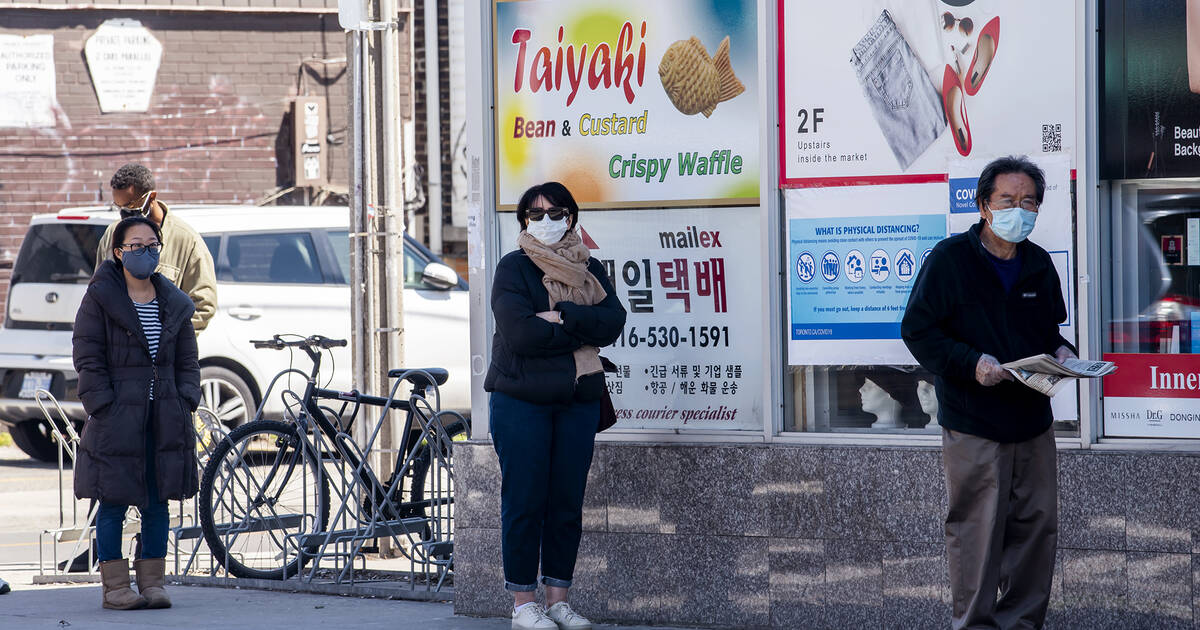
Do you have to wear a face mask in Ontario? When is wearing one mandatory?
As lockdown restrictions in Ontario slowly begin to loosen up, these are the questions some people are asking.
And if you haven't noticed, health officials in Ontario continue to implore the public to exercise the hygiene habits that have become second nature over the past few months — including wearing face masks in some settings.
Though the federal government acknowledges that non-medical grade masks have not been proven to protect wearers from COVID-19, it does call a face covering of any kind "an additional measure taken to protect others around you" in public settings, and has even issued instructions on how to make one.
For instructions on how to make your own face mask visit the Government of Canada Website. https://t.co/A7cuHAHX8F pic.twitter.com/flIymyUSFh
— Joe Loos (@vrvstudio) April 18, 2020
Face coverings can indeed drastically inhibit the spread of droplets from the mouth or nose that are released through coughing, sneezing or just normal breathing. Masks also tend to prevent the wearer from touching their face, which helps to safeguard both them and those around them.
For these reasons, many regions of the country are planning to somehow incorporate mask wearing into their new post-coronavirus normal.
In Quebec, citizens have been directed to wear masks if they leave their house at all, while in Alberta, 40 million cloth masks will be mailed out to residents for use in settings where they might not be able to stay the requisite two metres away from others.
In neither place are face coverings mandatory, though they definitely are for all airline passengers in Canada.
Cities like Ottawa have also jumped on the pro-mask wagon, while south of the border, the Centre for Disease Control and Prevention has likewise suggested the use of any type of face covering at this time.
I'm following the advice of @VeraEtches @ottawahealth by wearing a mask to help protect those around me. I'm challenging my fellow @ottawacity Councillors to do the same! Reply with your #MaskSelfie & tag 3 others to challenge them! Let's lead by example! #WeAreInThisTogether pic.twitter.com/hYEJ3Cmgpr
— Keith Egli (@KeithEgli) May 13, 2020
For Toronto specifically, Mayor John Tory has speculated that there will likely be some sort of recommendation in the coming weeks for individuals to wear masks in public places like stores, restaurants, public transit or on the street, telling the Star that the idea is "under very active consideration as part of the recovery and reopening plans for the city.”
Dr. Eileen de Villa, the city's Medical Officer of Health, has said that masks are merely one safety measure that can be employed these days, and are certainly no substitute for physical distancing, hand washing and staying home.
"Wearing a cloth mask or scarf is just one more thing you can do, if you choose to, to help protect others," she said in a statement from Toronto Public Health.
Effective April 20, 2020 at 10:00am, the Government of Canada is asking that all travellers have a removable non-medical mask or face covering large enough to cover their mouth and nose during their travel through Canadian airports and in-flight. https://t.co/xsvjhELX9h pic.twitter.com/E8V03vJybj
— Saskatoon Airport (@fly_skyxe) April 20, 2020
Meanwhile, Canada's Chief Public Health Officer Dr. Theresa Tam has advocated for the use of masks of any kind for weeks now (after initially saying they were unnecessary), saying in a press conference on Friday that masks are especially pertinent in regions where COVID-19 activity is high and in situations where two metres of physical distancing may not be possible, such as on public transit.
She suggests wearing a mask in certain scenarios, along with proper social distancing, avoiding touching common surfaces, and washing and/or sanitizing hands well and often.
And, Ontario Premier Doug Ford supported her comments on mask-wearing in his press conference on Friday, saying to citizens "when you’re out in public, wear a face covering of some sort. It just protects a lot of people."
How does wearing a #facemask help control the #pandemic
— Melvin Mathews (@melvinsmathews) April 22, 2020
Have you been following basic #SocialDistancing #health #purpose #leadership #covid19 #QuarantineLife #coronavirus #medical #vaccine #risk #melvinmathews pic.twitter.com/qDH7ESBSBT
Several stores, such as supermarket chains Whole Foods and Longo's, have already begun asking (or telling) shoppers to wear masks, while retailers like Holt Renfrew are among those planning to hand out free disposable masks to customers at the door when they reopen.
Health officials are still advising the Canadian public to first and foremost continue to stay in when possible as economies open up, especially if they show even mild symptoms of the virus or have been around someone who has (though carriers can be asymptomatic). And, to follow the other ubiquitous sanitation and distancing protocols.
"The reality is that COVID-19 is still out there and it will be with us for the foreseeable future," Tam said. "So as local authorities continue to slowly reopen recreational, social and economic spaces, the right and safest way to go out is to go out smart."
by Becky Robertson via blogTO

No comments:
Post a Comment